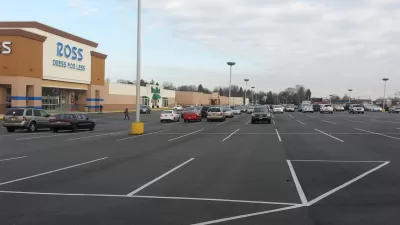Despite mounting evidence that parking requirements subsidize cars, raise the cost of housing, and contribute to greenhouse gas emissions, few policymakers have strongly advocated to end them.

While housing advocates praise Alexandria Ocasio-Cortez's move to call on city council candidates seeking her endorsement to fight to end single-family zoning, Nicole A. Murray calls on progressives like AOC to also address another component of zoning code that has far-reaching effects on housing affordability, density, and transit use: minimum parking requirements.
Originally pushed by the likes of The American Auto Association and Automotive Safety Foundation (which is associated with “automotive and allied industries“) to accommodate the influx cars in the post-war years, the parking requirements enshrined in the zoning law that has guided city policy since 1961 have mandated residential and commercial storage space for thousands of vehicles, regardless of proximity to (current or future) transit, the transportation needs and demographics of residents, or even local air quality or traffic-safety statistics.
Murray provides a list of reasons why mandatory parking requirements undermine affordable housing and public transit use. These include the high cost of building parking spots(which gets added on to the cost of housing units), the massive amount of space required for parking, and the added congestion that free parking encourages. They also raise costs for renters and carless transit users who don't benefit from parking. As Murray puts it, "Robert Moses couldn’t dream up a better deal to keep mass motoring alive." If Progressives want to make cities more livable and equitable, Murray argues, addressing parking regulations is an essential step.
FULL STORY: OPINION: Progressives Should Look To Outlaw Parking Minimums

Maui's Vacation Rental Debate Turns Ugly
Verbal attacks, misinformation campaigns and fistfights plague a high-stakes debate to convert thousands of vacation rentals into long-term housing.

Planetizen Federal Action Tracker
A weekly monitor of how Trump’s orders and actions are impacting planners and planning in America.

In Urban Planning, AI Prompting Could be the New Design Thinking
Creativity has long been key to great urban design. What if we see AI as our new creative partner?

How Trump's HUD Budget Proposal Would Harm Homelessness Response
Experts say the change to the HUD budget would make it more difficult to identify people who are homeless and connect them with services, and to prevent homelessness.

The Vast Potential of the Right-of-Way
One writer argues that the space between two building faces is the most important element of the built environment.

Florida Seniors Face Rising Homelessness Risk
High housing costs are pushing more seniors, many of them on a fixed income, into homelessness.
Urban Design for Planners 1: Software Tools
This six-course series explores essential urban design concepts using open source software and equips planners with the tools they need to participate fully in the urban design process.
Planning for Universal Design
Learn the tools for implementing Universal Design in planning regulations.
Gallatin County Department of Planning & Community Development
Heyer Gruel & Associates PA
JM Goldson LLC
City of Camden Redevelopment Agency
City of Astoria
Transportation Research & Education Center (TREC) at Portland State University
Jefferson Parish Government
Camden Redevelopment Agency
City of Claremont





























